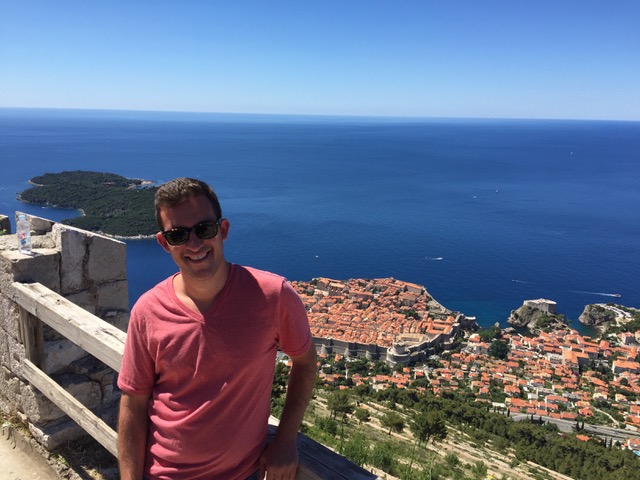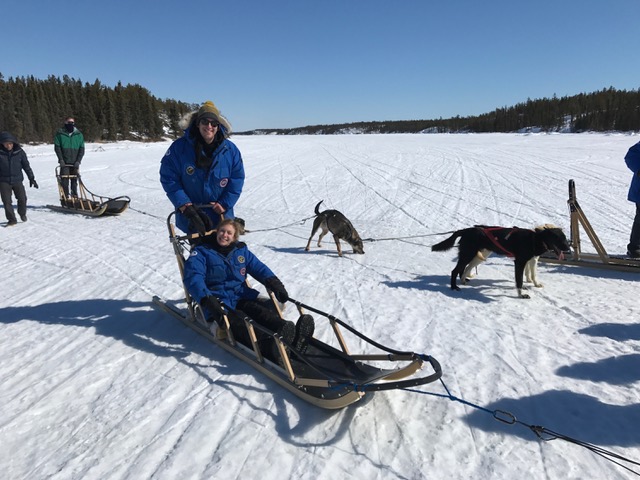KRU & A with Gilad Berenstein

With the graduating class of 2018, the UW Foster School of Business currently has 55,908 alumni. We publish Foster Business twice annually and feature a handful of alumni in each issue. That leaves a lot of untold stories. This is my attempt to help close the gap and a great excuse to meet some really amazing people.
Allow me to cast the spotlight on Gilad Berenstein (BA ‘09 MPAcc ‘10), founder of UTrip:
Andrew: Who was your favorite professor or what was your favorite class?
Gilad: My favorite was Bill Resler.
People ask me all the time how the hell someone like me ended up in a tax program. The only answer I have is that I fell in love with Bill Resler. I took him for undergrad tax. The first day of class, he said to the class, “Most of you will hate this. A few of you will find that you like it, and even fewer of you might find that you’re good at it.” I got a 4.0 in the class, and then I figured, “Wow, if I got a 4.0 in the class, I must be a tax guy.”
My senior year, I went to the Duchess, where you would see Bill. We had a conversation. He goes, “What do you want to do after school?” I said, “I want to be an entrepreneur, but I don’t know.” It was 2009. The economy was in the s—-r, and Bill said, “Well, why don’t you do the MPAcc program?” It was an amazing experience.
Andrew: When did Utrip officially launch?
Gilad: We launched our beta and incorporated as a C corporation in July of 2012. With any startup, the idea was probably a year and a half old by that point.
After graduating, my buddy Matt Robson and I crammed for the CPA and took it, and then we took a trip to Europe before starting jobs at PwC. The real seed for the idea came from that trip to Europe. It got me asking questions. “How do you make trips more personal? How do you make trip planning a little bit easier? What technology is out there that could help us with this stuff?”
Andrew: What’s your elevator pitch?
Gilad: Utrip is an artificial intelligence recommendation engine and personalization platform built specifically for the travel space. We work to make trip planning easy, enjoyable, and personal. By doing so, we help travel brands increase engagement, conversion rates, and share of wallet.
Andrew: B2C or B2B?
Gilad: We’re a B2B business with a B2C product. It took me a long time to get that exact narrow focus.
Andrew: Tell me business lesson that you can’t learn in the classroom.
Gilad: I used to speak in Deb Hagen-Lukens’ entrepreneur marketing courses. One of the things students would often ask me is, “How do you have this amazing network of advisers and investors?”
I always told them the secret is that there’s no secret. It’s just legwork. You do it for a year, and you start right now when you’re a student at UW. Everyone says yes to meeting with a student. You can build it up that way.
Andrew: Who are some the advisors who helped you with Utrip?
Gilad: John Castle who taught the Creating a Company class. I wasn’t in the class but my buddy, Edan was so we said, “Let’s get coffee with him.” The funny thing is, he said, “I bet there’s gonna be a B2B opportunity there.” I was at 23. I said, “Oh, (expletive) B2B. I wanna be a B2C company.”
Susan Joslyn, who’s a professor in the Psychology Department at UW, was a very early advisor of ours and really helped us at the beginning think through the psychology of tripling and the psychology of decision‑making in a really valuable way.
Then we have Oren Etzioni in the computer science department. Oren was as an early adviser as well. I had a lot of help from the UW.
But, if I think Court Lorenzini, who founded DocuSign, is probably the single most important, because he’s been with us across the journey. His advice has been invaluable.
Andrew: What’s a business-related task that you hope you never have to do again in your life?
Gilad: I’m assuming firing people is not included. That’s the absolute worst. Even when someone is not doing a great job in their role. It just drains me for days. It just sucks letting people go.
Andrew: Do you have a personal motto that you live by?
Gilad: More of a motto in terms of my work would probably be focus. If you have my team in here instead of me and ask, “What is Gilad a broken record about?” It’d be focus and the fact that none of us are smart enough, none of us have enough time, none of us have enough mindshare to be good at everything or to focus on everything.
Andrew: Do you consider Utrip a success?
Gilad: I consider it a success, though unfortunately not by a financial definition – yet.
We’ve helped more than 15 million people see the world in personal ways. Through those people, the average trip is for more than 2 people, so it’s closer to 30 million people who’ve gone on Utrip itineraries.
Travel is one of the greatest things that life has to offer both for personal benefit and global benefit. People who’ve traveled the world are typically more open‑minded; realize that their way of life is not the only acceptable way of life.
That means a lot. I believe that the “one size fits all” mindset should be history. The world’s too interesting for us all just to go the Louvre and Eiffel Tower when we visit France. We offer personalized options. From that perspective, we’ve been successful.
Andrew: What’s your favorite souvenir from your travels?
Gilad: I used to collect a bunch of stuff. Now I collect coins, and one postcard.
I have a good friend who’s a teacher. I mail the postcard to her class. On her class wall, they’ve now got postcards from all over the world.
I always like to take a coin. It’s whatever coin is left in my pocket at the end of the trip. I feel like there’s something about that that’s serendipitous. I also try to bring them back with me next time to use them. It’s kind of a way to ensuring I have a ‘reason’ to go back.
Oh, one more I forgot. Menus. I’m a huge foodie.
Andrew: Perfect transition to my next question. I heard that you are a foodie so I have a couple of food-related questions for you. If you only had access to two herbs or spices for the rest of your life, what are the two?
Gilad: The first one is easy, zatar. Incredibly popular in the Middle East. Hilariously expensive in the US to buy, even though it’s like free over there. I can put it on everything. It’s delicious.
What’s the other one? I’ll say cilantro. I love Mexican food. I didn’t discover Mexican food until I was a teenager, because in Israel, as you can imagine, there are not a lot of Mexicans. I just came and I was like, “Oh my God.” It’s like I’ve been missing this whole part of my life and it’s so delicious.
Andrew: What’s currently your favorite restaurant in Seattle?
Gilad: Copine and Sawyer in Ballard. I absolutely love Copine. Eden Hill on Queen Anne Hill. That’s my neighborhood restaurant. Probably my favorite restaurant in the last few years is Manolin in Fremont. It’s is so freaking good.
Andrew: Switching gears, favorite podcast?
Gilad: Every morning as a part of my morning ritual, I listen to “Marketplace Tech” and “Marketplace Morning Report.” I do it between the shower and leaving the house.
“Exponent” by Ben Thompson is my recommendation to all business people out there. He writes and talks about the business of technology and is just incredibly insightful. It’s long-form, it’s an hour.
I also just started listening to Slow Burn season one. Oh my god it’s good!
Andrew: What’s the future of AI?
Gilad: I think you’re going to see a lot of human AI hybrids. Just like Utrip.
Utrip combines chefs and artists and historians and tour guides with millions of reviews and billions of data points, etc. I believe we’re going to see, whether it’s financial services, whether it’s healthcare, whether it’s education, I think you’re going to continue to see AI human hybrids come together.
I was meeting with Orin [Etzioni] a week or two ago. I always like to ask him at the end of our conversation, “What are you working on?”
He said a few years ago it was context. Now, he’s talking about AI – human communication. If I said to you, “You have x type of cancer. Your doctor’s historical record is 90 percent at curing this cancer. This computer’s record is 95 percent.” Whose advice are you going to take?
There’s not a right or wrong answer. Every human being’s going to have to make their own decision about who they’re going to trust and it’s very tough. I think, and Orin thinks, that for a long time, we’re going to trust the human who was wrong more often than the computer.
But he’s going to talk to us and say, “The reason I think this is because blah, blah, blah. When I worked with my last patient, we did blah, blah, blah.” We all know that just because something worked for one data point, your last patient means nothing about what it’s going to do for me, but as a human, it makes you feel good.
I say this all the time. Tom Douglas is one of our experts in Seattle. He can tell us where to have a great salmon dish tonight that might be a worse recommendation than the 10 million reviews that are on TripAdvisor, but we’re going to feel (expletive) awesome about that Tom Douglas recommendation.
Andrew: What’s your next destination?
Gilad: The next place on my list is Brazil. I have never been, and I really want to go.
Andrew Krueger is the Director of Alumni and Media Engagement at the Foster School.

